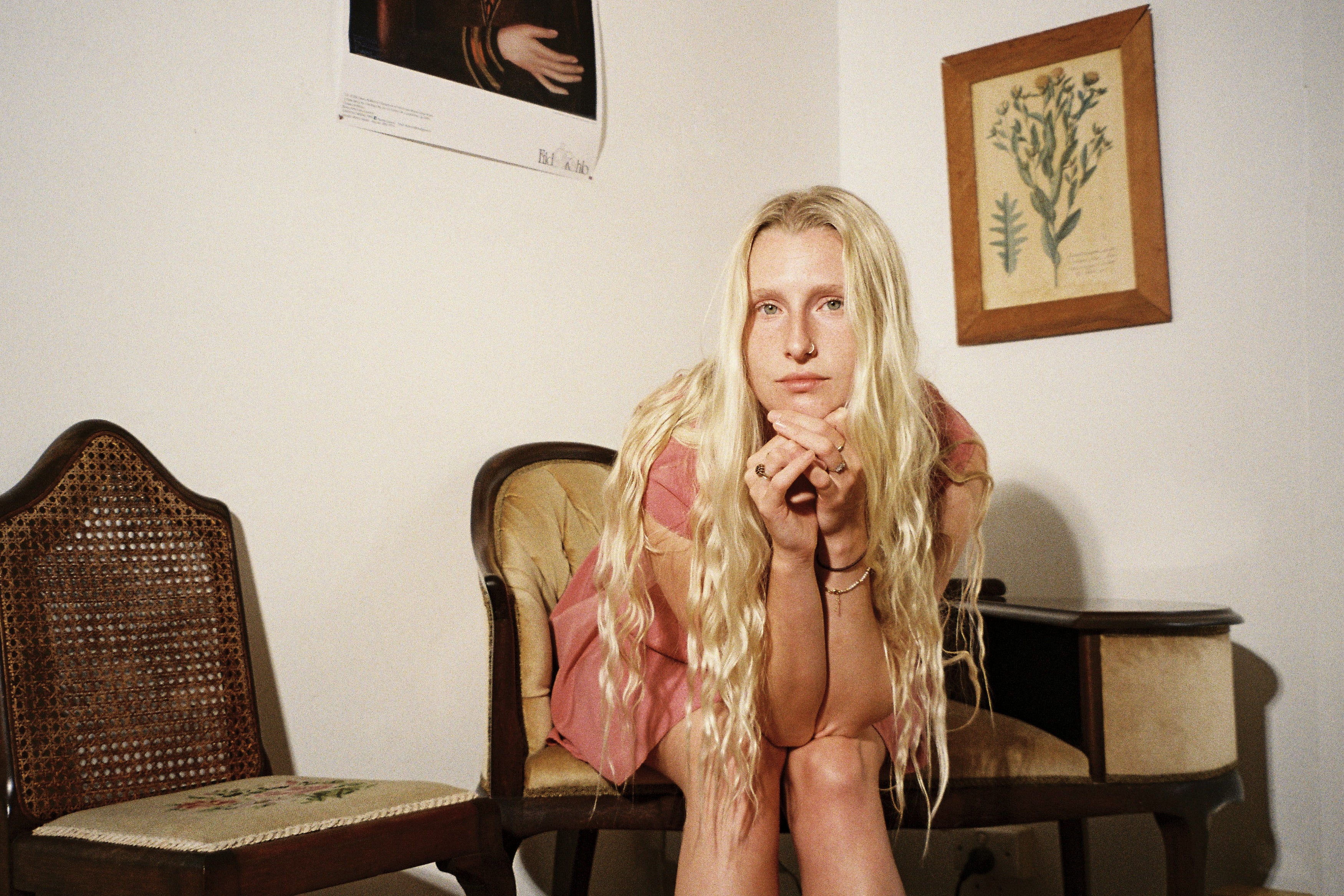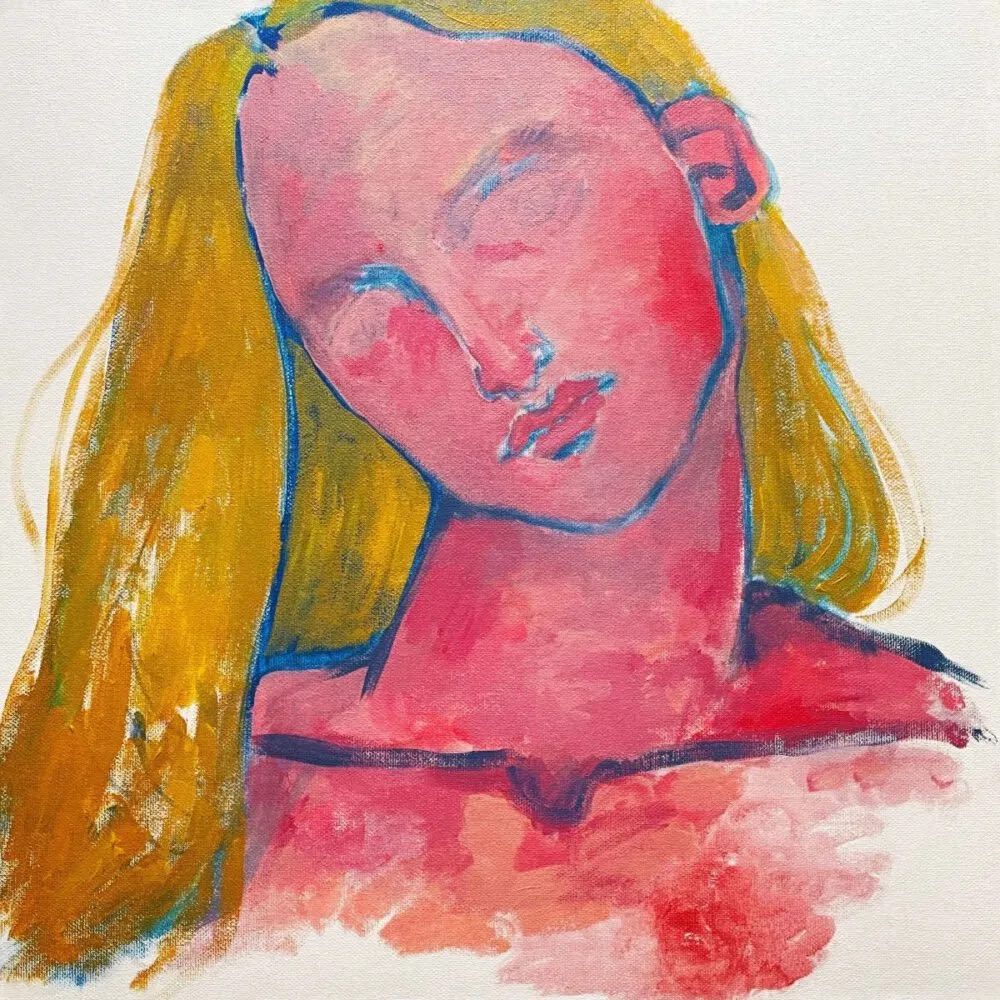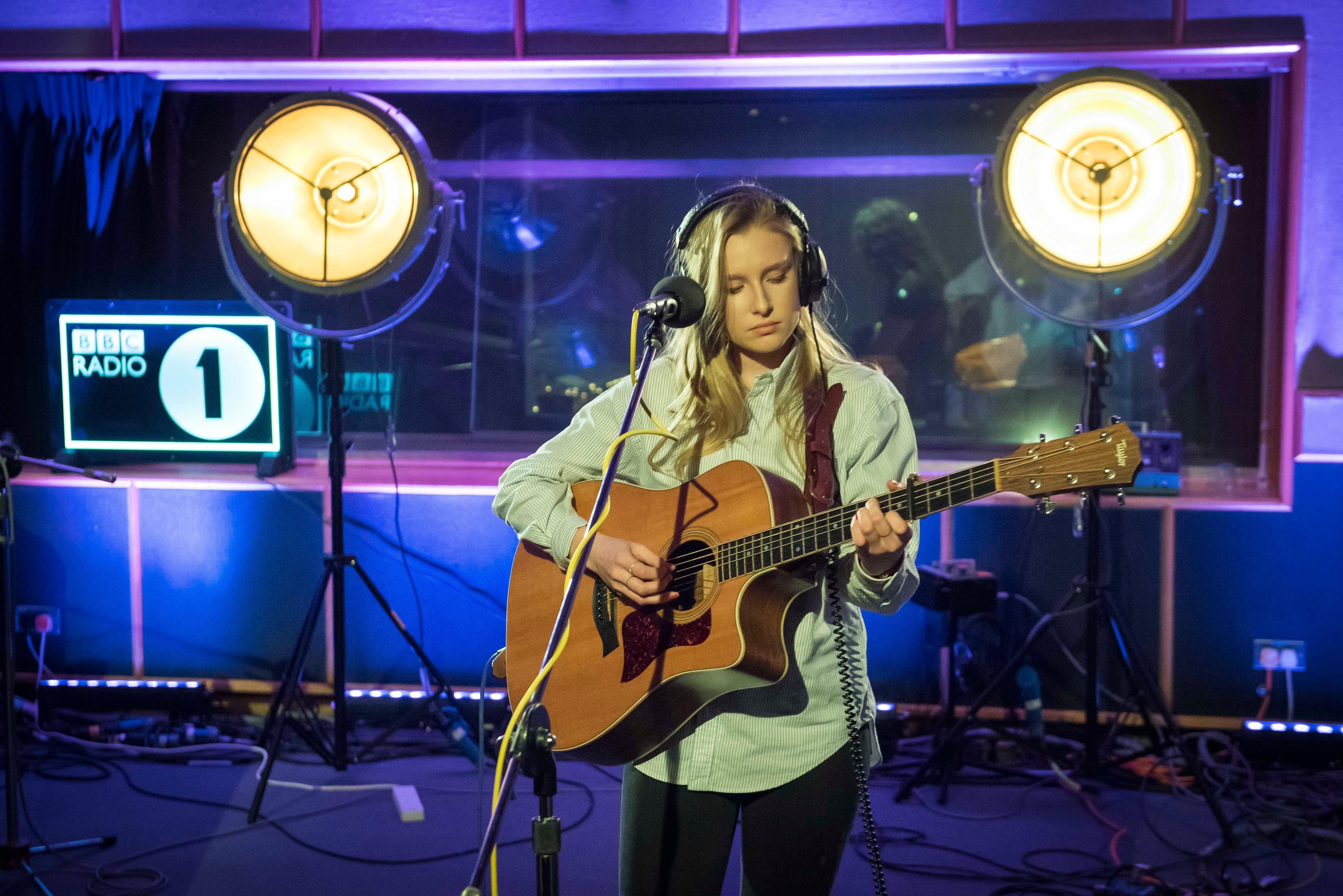
Never meet your heroes is quite accurate, actually,” says the woman sitting opposite me. “Unfortunately, all our heroes are bastards.” Oh dear. It’s pretty ironic that contemporary folk artist Billie Marten is saying this to me, of all people. She’s one of my heroes, but if she is a bastard, she’s hiding it incredibly well thus far.
Truth be told, this isn’t our first meeting. A few years ago, I found myself chatting with a slight young woman at a friend’s party and idly asked what she did for a living. “I make music,” came the reply. Something stirred in my memory at that moment, and I peered more closely at the ethereal face before me: blue-green eyes like wave-softened chips of palest sea glass; creamy skin flanked by curtains of flaxen hair. I remembered with a jolt that she’d introduced herself as “Billie”.
“Wait – you’re BILLIE MARTEN!” I all-but-screamed in the poor woman’s face. “I LOVE YOU!! I’ve been listening to you on repeat while lying in parks and getting over my ex-boyfriend!!!” I’d become mildly addicted to Marten’s voice that summer – so hauntingly pure that it would crack open my ribs and pluck at my heartstrings whenever it caught just-so on certain notes, like a prism bending light. I wasn’t the only one, it seemed – originally from Ripon, Yorkshire, the now 26-year-old was first “discovered” at the tender age of 14, having started her own YouTube channel five years prior and garnered viral acclaim for her cover of Lucy Rose’s “Middle of the Bed”. By 15, she’d already signed to Chess Club Records, a subsidiary of Sony Music, with whom she recorded two albums: Writing of Blues and Yellows and Feeding Seahorses by Hand. Her 2016 single, “La Lune”, has racked up more than 88 million streams on Spotify.
But back to that cringe first encounter. She was very nice at the time, but somewhat startled, and the conversation petered out shortly afterwards. Clearly, I should never meet my heroes, though less for Marten’s reasons and more to avoid a restraining order.
Thankfully, today seems to be a clean slate. Arriving 10 minutes late to the east London café where we’re meeting to talk about her latest album, Dog Eared – her Uber was stuck behind a surreally long funeral cortege – Marten remains characteristically calm and unflustered. “Self-possessed” is perhaps the word that best does justice to her general aura.
Dog Eared is Marten’s fifth studio album and, it’s safe to say, the most pronounced stylistic shift from those that have preceded it. The former starkness of her solo vocals and stripped-back guitar strumming gives way here to a much richer, fuller sound, courtesy of a stellar band assembled by producer Philip Weinrobe. It’s an intentional departure, a conscious backing out of the wishy-washy “singer-songwriter” genre that nowadays seems to be slapped on “anyone with a guitar and a mouth”, as Marten puts it. Neither she nor Weinrobe had any interest in making simply another “pretty” record.
“I feel like music has become a little bit too easy, a little bit too soft, or it’s incredibly jarring post-punk,” she muses. “There’s nothing in between – so I was asking myself and others for some musical interest.”

Though the resulting 10 tracks aren’t unrecognisable from her earlier work, they are undeniably more challenging to the ear. It’s a burlesque dancer of an album – one that reveals itself slowly, layer by complex layer, over multiple listens, exploring themes of identity and transitions. As The Independent’s Helen Brown put it in her five-star review: “Given time and attention, the confident craft of the songwriting and mellow musicianship will sink their grooves into the soul.”
Even the natural “prettiness” of Marten’s voice is muted, a consequence of both “smoking too many cigarettes” and singing in the studio “without hearing – so I had no control over tone”.
The whole process of making Dog Eared, too, was markedly different. The other musicians were encouraged to bring their own creative impulses to bear on Marten’s songs, rather than looking expectantly at her for direction. Working collaboratively brought with it an “immense sense of relief”, she says – a feeling of pressure finally being lifted.
Did it feel more like being in a band? “Yes! And all I want to do is be in a band. I want to be in someone else’s band, playing guitar at the back.”
The music industry is so sly – it’s slow and calculated manipulation
This longing to tuck herself away from the foreground perhaps makes more sense in the context of Marten’s solo career thus far. She may be young, but she’s been at this game for a long time: 12 years and counting. And the experience of being signed as a teenager, far from being the “dream” that every aspiring musician strives for, left her irrevocably jaded.
“Here’s the thing – music is so sly,” she says. “They make you think that it’s your decision. It’s a slow and calculated manipulation. That’s my experience anyway.”
Marten was right on the cusp of the industry changing, but the prevailing attitude remained that a major label would define your success. “I was pulled into the whole ‘you’re going to be a big star. We’re going to put you in writing rooms because you can’t write a song. We’re going to make you into this thing.’ No matter how many times I said no, it was overlooked,” she says of that time. But despite her young age and big talent, Marten had no interest in becoming the UK’s answer to Taylor Swift; she was already sure enough in her art and ambitions that the cookie-cutter, pop-folk trajectory being thrust upon her held zero appeal. “I just wanted to be a small singer-songwriter,” she says simply.
More than a decade on, Marten still feels “trapped” by her own musical origin story. No one, it seems, wants to let her grow up. “I’m still a ‘rising’, 12 years later,” she says wryly. “People think of me as a 17-year-old girl, and that was such a long time ago now.”
Yet this current iteration of Marten is worlds away from the teen version. The latter’s music was forged from anxiety, so much of her creative expression derived from struggles with mental health and an intricate web of intrusive thoughts. Though these haven’t disappeared, they’re more manageable these days: “I’m much better at recognising them and seeing that they’re irrational,” she explains.

Part of this newfound stability has come from finding happiness in other areas of life, too: Marten has been with her partner, Will Taylor of the indie band Flyte, since 2019. “I was actually told by a previous manager that our relationship would never work because we’re both musicians,” she recalls with mild amusement now. “You know, actors and actors, musicians and musicians – ‘They’re all ego, how could they possibly have attention and time for one another?’ I think everybody’s wrong, and the people who say that aren’t musicians or actors.”
In many ways, Marten never really had the chance to be young and carefree. She was, after all, meeting with financial advisers and making life-changing career decisions at the age of 14. Does she feel she was robbed of her childhood? “Yes,” comes the emphatic response. “There’s a lot of that on Dog Eared… It’s why I’m caught in this chasm of feeling too old and weary and also feeling like a fresh baby who’s discovering the world for the first time.”
This contradictory duality comes across in both her music and conversation – a beguiling combination of innocence interwoven with old soul wisdom. And, occasionally, cynicism: in a previous interview, Marten notably described being dropped by Sony in 2019 as the best day of her life. “I stand by it!” she laughs now.
Signed to Fiction Records since 2020, with whom she released 2021’s Flora Fauna, 2023’s Drop Cherries and this year’s Dog Eared, Marten has seen the music industry change beyond all recognition. The old powerhouse labels are now reduced to irrelevant monoliths, the offices themselves more like museums dedicated to historic successes; “You know, these old relics of the platinum record in the toilet somewhere, but no one who’s working there now worked on that record.”
It’s just a capitalist mentality, and we’re all paying Taylor Swift
Yet the shifting of power from labels to streaming platforms has, argues Marten, made things immeasurably worse – at least for the majority of artists. Kate Nash made waves last year by announcing that she’d had to turn to OnlyFans to help fund her tours. Is the situation really that dire?
“Mostly, artists are in financial ruin no matter how successful they appear to be,” Marten affirms. “I’ve worked the hardest and the longest and I am the most busy I’ve ever been – and I am not doing great.”
Fair compensation has always been tricky to advocate for, considering that most musicians are more passionate about making music than money – “It’s cool to be in music, so why should you also get paid?”, Marten quips. She describes it as a reverse pyramid scheme: the artist is treated like they’re kings and queens at the top, waited on and chauffeured, with everyone else bowing down. But the reality is starkly different. “Everyone that’s hanging onto the artist is buying houses and having families and going on holiday,” says Marten wryly. “And the artists could never dream of doing that. It’s funny.” Though perhaps not “funny ha-ha”.
Rising overheads, inflation and shrinking show fees for touring artists are all major issues. But the biggest problem, financially, is the way we now consume music, which favours the tiny number of players at the top.
“There’s too much music and there are too many famous people,” Marten says frankly. She describes the Spotify royalties’ structure, which rewards those with the most plays with a bigger piece of the financial pie. “Less money is going to mid-level and low-level artists. It’s a capitalist mentality, essentially, and we’re all paying Taylor Swift.”
Though Marten’s music has generated money from streams, she’s never seen any of it. “I haven’t recouped my deals, so it’s all gone to Sony to pay for the sofas in their office,” she shrugs. “Hey, I am not cynical! It’s just the facts. I’m also not complaining. I’m speaking for all of us who have made peace with it, because we’re nice people who just want to make music. But should we make peace with it? And how do we change it?”
Change also seems slow going when it comes to toxic behaviour in the industry. Why does she think this area of the arts never really had its #MeToo reckoning? “That’s a good question,” Marten sighs. “I mean, there was the Ryan Adams thing, and that seems to have completely disappeared.” She’s referencing a 2019 exposé in The New York Times in which the indie singer was accused by several women – including musician Phoebe Bridgers and Adams’s ex-wife, actor and singer Mandy Moore – of emotional and verbal abuse. Adams vehemently denied all allegations at the time, before writing a lengthy public apology letter a year later.

Though nothing “dramatic” has ever happened to Marten herself, she has been indirectly impacted by sexual misconduct. While performing as a solo support act on another band’s tour, she received a message from a fan making allegations about a fellow musician’s behaviour. Marten immediately jettisoned herself from the situation, abandoning the tour and losing a substantial amount of money in the process. “I just wasn’t prepared to share a stage with something I didn’t agree with,” she says. “It was a very sad day for me, because I felt very lucky to be in that position – to work with someone I loved and admired.” Hence her opening comment: never meet your heroes.
Though, I must admit, I have no regrets about meeting mine this time around (and not just because I’ve largely managed to avoid humiliating myself). Here is a woman who has, against the odds, managed to hold onto principles and idealism alongside the world-weary ennui. Who, despite her undeniably pretty voice, has done more than make a pretty record. “I just always hope that I’m making work that I believe in, and I’m making work for the right reasons,” she says when I ask whether her dreams have changed. “I hope that people find a home in it. And I hope that it’s an antidote to whatever their poison is – because I’ve seen people go through a lot of pain.”
‘Dog Eared’ is out now with Fiction Records
Billie Marten’s Dog Eared is a brilliant, soothing album with looming danger
The Legend of Zelda live-action film announces cast for Zelda and Link
Jane’s Addiction suing singer Perry Farrell for $10m after brawl halted tour, album
‘I’d broken out of the cult’: When Robbie Williams quit Take That
15 terrible albums by classic bands
Pop star Lydia Night: ‘Being messy is excused – but only if you write about it’







